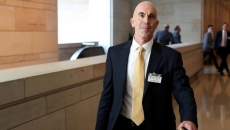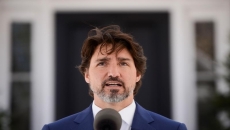Canada is already contemplating the measures it will take to safely end restrictions on international travel, Prime Minister Justin Trudeau said Tuesday as he confirmed that the United States has agreed to extend the mutual ban on non-essential border crossings for another 30 days.
The ban, which prohibits discretionary travel like vacations and cross-border shopping without restricting trade, commerce and essential employees, was set to expire Thursday until the U.S. agreed to Canada's request to extend it to June 21.
What happens then remains an open question, but one the federal government is already thinking about, said Trudeau, who described the U.S. as a "source of vulnerability" when it comes to the risk of importing cases of COVID-19.
"We've given ourselves another month before we have to have the right answers to those questions on non-essential travel," he said.
"Even now, we know that we need to do more to ensure that travellers who are coming back from overseas or from the United States, as Canadians, are properly followed up on, are properly isolated and don't become further vectors for the spread of COVID-19."
"We're working closely with the provinces to ensure that arrival of people into Canada — even now, but certainly once we get to a point where non-essential travel picks up again in the coming months, I guess — we need to have strong measures in place."
The U.S. has more than 1.5 million active cases of COVID-19, 42 per cent of the world's active caseload, and a death toll that crossed the 90,000 threshold over the weekend, worsening at a rate of more than 1,000 fatalities a day.
U.S. President Donald Trump, asked about the border restrictions Tuesday during an event at the White House, acknowledged the ongoing talks with Canada — "we're very close to Canada," he said, describing Trudeau as "a friend of ours" — but also signalled his long-standing desire to get the U.S. open and back to business sooner rather than later.
"As things clean up in terms of the 'plague,' we're both going to want to do the normal — we want to get back, everything we want to get back to normal," Trump said.
"We're very confident that we're going to have a tremendous, tremendous turnaround. We had to turn it off artificially, and now we're turning it back on, and you're going to see some tremendous numbers."
Notwithstanding reports of the occasional snag, officials and stakeholders on both sides of the border have consistently hailed the partial border restrictions as a success in curbing the spread of COVID-19 while ensuring vital supply chains remain largely intact.






